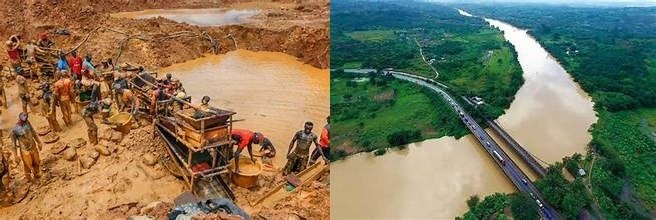
Angelina Manye Buah

Sanitation, an often overlooked aspect of daily life, is a fundamental pillar of public health and well-being. While significant progress has been made in improving access to clean water and sanitation facilities over the years, a formidable sanitation crisis persists across the globe.
Millions of people continue to lack access to proper sanitation, leading to dire consequences for human health, the environment, and overall socio-economic development.
Accra, the vibrant capital city of Ghana, stands as a microcosm of the larger sanitation crisis gripping many urban areas around the world. Despite strides in development, the city grapples with a formidable sanitation crisis that threatens the health, environment, and overall quality of life for its residents.
As the population swells and urbanisation accelerates, urgent measures are required to address the pressing challenges that have turned the spotlight onto Accra’s sanitation predicament.
Due to its growing population and swift urbanisation, Accra has faced challenges in meeting the increasing demands for effective waste management and sanitation provisions. The Medium-Term Development Plan (MTDP) spanning from 2006 to 2009, formulated by the Accra Metropolitan Assembly (AMA), the local governing body, has described the current state of sanitation in Accra as very unsatisfactory and characterised by choked drains, indiscriminate waste disposal, and uncollected refuse in central waste containers.
This situation is even worse in the poor urban neighborhoods of Accra, which are characterised by overcrowding and inadequate sanitary facilities. The piece aims to elucidate the intricate nature of Accra’s sanitation problems while delving into potential remedies for this pressing issue.
Urbanisation
A key challenge facing many countries in the developing world undergoing rapid urbanisation is the issue of sanitation and waste management. Ghana, like many countries in sub-Saharan Africa, is undergoing rapid urbanisation. The population of Accra has been continuously rising because of both internal migration from rural areas and the natural expansion of the metropolis.
Rapid urbanisation has placed significant pressure on the existing sanitation infrastructure. This strain has manifested in insufficient waste collection, subpar disposal methods, and a notable rise in environmental pollution. The daily volume of waste generated in Accra now surpasses the city’s waste management capabilities, resulting in an overall deterioration of the sanitation conditions.
The poor quality of waste collection services is one of the main problems facing Accra’s sanitation system. Many communities are underserved since the city’s current waste collection infrastructure has trouble covering large sections of the city.
Residents who live in areas without regular garbage collection often turn to illegal dumping, which worsens the risks to their health and the environment. Further exacerbating the sanitary crisis is the out-of-date and overburdened waste disposal transport infrastructure, which makes it difficult to remove and dispose of trash effectively.
Open defecation
The issue of open defecation, which endangers people’s health and diminishes their sense of dignity, is another issue Accra is dealing with. Despite initiatives to increase access to sanitation facilities, a sizeable section of the population still lacks access to basic toilets.
Due to this, people are forced to use improvised natural facilities or unhygienic public restrooms. Public health is put at risk because waterborne infections spread more readily when there aren’t reliable, well-maintained restroom facilities.
Water bodies in and around Accra have become contaminated as a result of inappropriate solid waste disposal, including plastics and other non-biodegradable items. In addition to endangering aquatic life, this pollution puts human health at risk.
This is because water is used for numerous activities like fishing, swimming, washing, and drinking. Recent statistics from the World Health Organization (WHO) and United Nations Children’s Fund (UNICEF) Joint Monitoring Platform (JMP) indicate that over 844 million people still lack access to potable water.
Additionally, the buildup of waste in open areas and drainage systems restricts water movement and causes flooding during heavy downpours. This environmental degradation makes it harder to improve sanitary conditions all around.
Sustained efforts
Overcoming the sanitation crisis in Accra requires a multi-faceted approach that involves government action, community engagement, public awareness, and sustainable infrastructure development.
Although significant efforts have been made to tackle the crisis, including the ambitious targets of Sustainable Development Goal 6 (to ensure access to safe water resources and sanitation for all by 2030), there is a need to explore the factors behind the low sanitation coverage if the ambitious targets of the current Sustainable Development Goals (SDGs) on sanitation are to be achieved by 2030.
Innovative approaches have shown potential for enhancing garbage collection and disposal systems, such as Zoomlion Ghana, Safisana, community-based waste management programs, and larger public-private partnerships.
Strong political commitment and leadership are essential to drive change. The government should prioritize sanitation issues and allocate sufficient resources for sanitation infrastructure development and maintenance. The government should enact and enforce stringent sanitation laws and regulations to ensure proper waste disposal, recycling, and sewage management.
Government must also invest in the construction and maintenance of proper waste management facilities, including waste collection centers, recycling facilities, and sewage treatment plants. We must improve waste collection systems and establish a comprehensive network of collection points to ensure regular waste removal from homes, businesses, and public spaces.
Public awareness
Additionally, the various sanitation agencies should raise awareness about the importance of proper sanitation practices through educational campaigns, workshops, and community outreach programmes. They should encourage residents to take ownership of their surroundings by promoting responsible waste disposal and recycling habits.
There should also be waste segregation and recycling. Government should promote waste segregation at the source to separate organic and inorganic waste, making recycling and composting more effective. Establish recycling programmes and facilities to process recyclable materials and reduce the volume of waste sent to landfills.
More importantly, I believe that in order to make meaningful changes to Accra’s sanitation issues, consistent dedication and cooperative efforts at all levels are necessary. Addressing the sanitation crisis in Accra requires a comprehensive and sustained effort from various stakeholders, including government bodies, local communities, private sector entities, and civil society organizations.
By combining these strategies and fostering a culture of responsible waste management, Accra can gradually overcome its sanitation challenges and create a cleaner, healthier environment for its residents.
The writer is a student of the University of Media, Arts and Communication – Ghana Institute of Journalism (UniMAC-GIJ).








